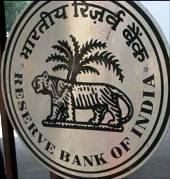 Corporate India was left wanting for more, following the announcement of a 50-basis-point cut in the cash reserve ratio by the Reserve Bank of India on Tuesday.
Corporate India was left wanting for more, following the announcement of a 50-basis-point cut in the cash reserve ratio by the Reserve Bank of India on Tuesday.
At a time when headline inflation has been moderating, most were expecting the central bank to take a firmer stance on growth.
What they got instead was what some privately describe as mere 'tokenism'.
Venugopal Dhoot, chairman & managing director, Videocon Industries, said, "It would have helped had the central bank cut the repo rate. Lending rates would have come down, giving a boost to growth."
This sentiment was echoed by Harsh Mariwala, chairman & managing director, Marico Ltd, "The RBI is cautiously optimistic, which is why a CRR cut rather than a repo cut."
Rajeev Talwar, group executive director, DLF, minced no words by saying that the central bank should have acted with utmost speed.
"It would have boosted consumer confidence which is very essential to drive growth. RBI's extreme cautiousness is discouraging. Instead of asking government to kick-start reforms, the central bank needs to be serious about boosting growth. What are they waiting for?"
Kishore Biyani, chief executive officer, Future Group, said: "A cut in the repo rate would have been a great leap forward.
"That was the need of the hour." K Sridharan, chief financial officer, Ashok Leyland, said the need of the hour was a 50 bps cut in the repo and reverse repo rates.
Pradeep Jain, chairman of Delhi-based Parsvnath Developers, was vocal that the central bank's 'delicate balancing act' is woefully inadequate.
Some corporate chieftains remained optimistic that the much-expected cut in policy rates would happen sooner rather than later.
Ajay Chandra, managing director, Unitech, said, "A reduction in the CRR is a positive move from the RBI, as it will increase the credit-supply
"Niranjan Hiranandani, managing director, Hiranandani Constructions said the CRR rut was a clear indicator that interest rates could come down in the future.
V Balakrishnan, member of the board and chief financial officer, Infosys, said, "By cutting the CRR, directionally, RBI has sent a message of a softer interest rate regime, going forward. It is a fine balance they have done to maintain growth in the economy."
V Ashok, chief financial officer, Essar Group, said, "While one would welcome a rate cut to improve sentiment and growth prospects, we hope this will translate into action in the near future. Easing inflation and softening global commodity prices would enable RBI to reduce rates."
Harsh Pati Singhania, managing director, JK Paper, said, "I remain hopeful that the RBI will not miss any opportunity to restore the growth momentum in its anxiety to anchor inflationary expectations.
Business would like RBI to reverse its tight monetary policy at the earliest. This, in my view, is essential because it will take more efforts and time to restore growth if the slowdown goes beyond a point."
Chandrajit Banerjee, director general, CII, said while the move would help ease liquidity in the banking system, RBI needed to start reducing the repo rate as well, to start the investment cycle, which has weakened. R V Kanoria, president, Ficci, said a cut in the repo rate may have acted as a strong enabling factor in spurring investment activity.
Thanks to its anti-inflationary stance and a general slowdown in the economy, the RBI has revised its FY12 GDP growth forecast to seven per cent from 7.6 per cent earlier. This, says India Inc, only builds a case for the central bank to act fast.











